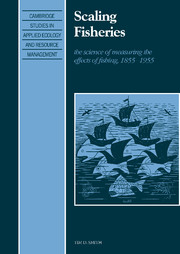Book contents
1 - Fluctuations, the very essence of ecosystems
Published online by Cambridge University Press: 22 September 2009
Summary
Ecosystems result from the integration of populations of different species in a common environment. They rarely remain steady for long, and fluctuations lie in the very essence of the ecosystems and of every one of the … populations.
Ramon Margalef 1960The truth of Margalef's observation was not apparent to scientists, fishermen, or politicians in the 1860s. The conclusion that ecosystems vary, and also the concepts used (population, environment, steady state, and even ecosystem) were virtually unknown. At that time, it was apparent only that catches varied from year to year despite the best efforts of the fishermen. The reality of this variation was painfully apparent. The amount of fish caught, and hence available as food, was much less in some years, leading at times to hunger. However, in other years the amount of fish caught was so high that prices plummeted and much went to waste, leading to economic difficulties. Catches might increase steadily for several years, encouraging investment in fishing gear and processing equipment, and leading to relocation of work forces, only to subsequently decline. Investments were lost, and people's economic plans and security compromised. The value of resources that are so variable is lessened. As Hugh Miller pointed out in an 1829 description of a Scottish herring fishery in the Inverness Courier:
Its value must therefore be estimated in the same way that Directors of an insurance office would calculate upon that of the life of one who had a hereditary tendency to apoplexy.
- Type
- Chapter
- Information
- Scaling FisheriesThe Science of Measuring the Effects of Fishing, 1855–1955, pp. 8 - 34Publisher: Cambridge University PressPrint publication year: 1994



